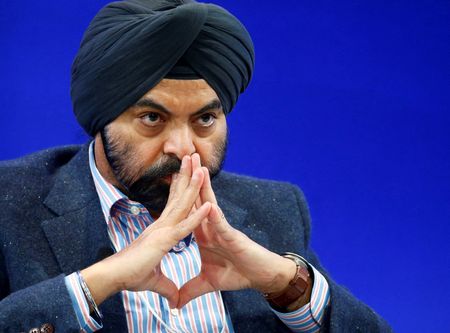 1
1 1
1

By David Lawder, Kanishka Singh and Andrea Shalal
WASHINGTON (Reuters) -U.S. Treasury Secretary Janet Yellen on Wednesday rejected the idea of a near-term capital increase for the World Bank and said she expected the U.S. nominee to lead the institution, former Mastercard CEO Ajay Banga, to be elected president of the multilateral lender.
Yellen told U.S. lawmakers that she wants World Bank reforms to vastly expand lending to fight climate change and other global crises, largely by stretching its existing resources, adopting innovative financing policies and mobilizing private finance.
A capital increase was among proposals the World Bank made in January. It would not be possible without the support of the United States, the World Bank’s dominant shareholder.
“We are not requesting a capital increase,” Yellen said during a budget hearing of the U.S. House of Representatives Appropriations Subcommittee on State, Foreign Operations, and Related Programs. “We do want to see better mobilization of private resources alongside World Bank investments as well, but we’re not requesting a capital increase at this time.”
The proposed capital increase was made when the World Bank unveiled an evolution road map to meet the challenge that Yellen laid out last year to expand its mission beyond country-specific development projects loans to tackle global crises.
The World Bank’s last capital increase, of $13 billion, was approved by member countries in 2018, but the lending capacity created has been strained by the COVID-19 pandemic and spillovers from Russia’s war in Ukraine.
“21ST CENTURY CHALLENGES”
The World Bank evolution plan thus far has been drafted under its departing President, David Malpass, who was nominated by former President Donald Trump and announced his resignation in February after his initial failure to say he backed the scientific consensus on climate change.
Malpass told Reuters in February that loan ratio reforms could unlock an additional $4 billion annual lending capacity — or $40 billion over a decade — a figure far below the hundreds of billions of dollars that a G20 report said was possible.
Yellen has previously called for the World Bank to take “bolder and more imaginative” steps to unlock more lending for climate change.
That plan is soon expected to pass to Banga, nominated by President Joe Biden. Yellen told lawmakers that she expects Banga, who has no challengers, to be elected World Bank president with a charge to evolve the institution to better address “21st century challenges,” including climate, pandemics, conflict and fragility.
Banga, 63, who was born and educated in India but is now a U.S. citizen, has already won the support of enough other governments to virtually assure his confirmation, including from Bangladesh, Britain, Colombia, Egypt, France, Germany, India, Italy, Ivory Coast, Japan, Kenya, Saudi Arabia and South Korea.
The World Bank’s window for nominations closes at 6 p.m. ET (2200 GMT) on Wednesday, with no signs of any challengers.
Yellen on Wednesday also said U.S. policy toward multilateral development banks’ energy finance is flexible and that some low-income countries may qualify for financing for natural gas projects if renewable energy is not feasible.
(Reporting by David Lawder in WashingtonWriting by Kanishka Singh and Andrea ShalalEditing by Gerry Doyle, Matthew Lewis and Leslie Adler)